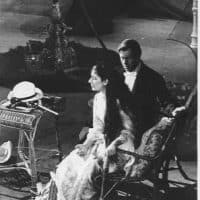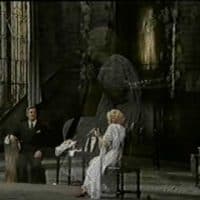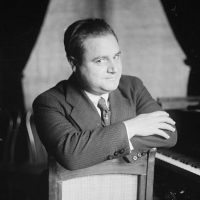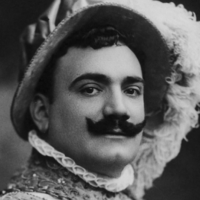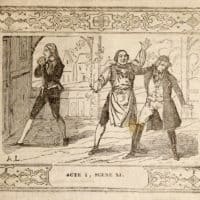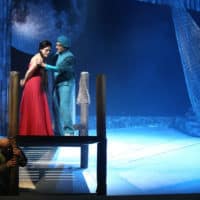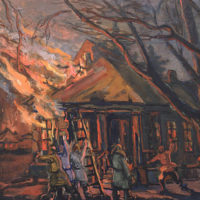1he music in Grollman’s life was music. He came to it gradually towards the end of high school via the one dollar recordings of Beethoven and Tchaikovsky issued under orchestral aliases; a final effort to milk a last profit from out of date pressings. The sound was ghastly, the performances problematical, but the music was there nonetheless. He didn’t listen to opera, more by accident than design. Grollman had listened to some operas as a boy of ten at the urging of his father who, despite his love for opera, never listened to them. Grollman, bored to death, thought he knew why.
In his second year in college he made a slight friendship with a slight Dutch boy named Daniel Boone. Daniel was a failed homosexual who in distress over this failure turned to opera. He had at this turn in his life seen Aida seven times, which he said with the same pride the average college student might declaim he had had seven orgasms in one night. Unfortunately, he did not own a phonograph – Grollman did. On an early fall Sunday evening, Boone, uninvited, entered Grollman’s room and used his phonograph to play the RCA recording of Verdi’s Il Trovatorefeaturing Milanov, Björling, Warren, and Barbieri. The recording was still relatively new and had just been acquired by Boone. Grollman had not yet returned from a four day weekend in New York. When he did Boone and three or four other misfits who were part of the small circle that included Grollman were midway between Ah si ben mio and Di quella pira.
Grollman was pissed that Boone had entered his room and used his phonograph unbidden, but said nothing. Since his uninvited guests did not leave, there was nothing to do but listen. Recognition was deep and sudden. The beauty of the music was immediate, its animation of the words was realized later when he took the time to study the libretto. By the time he graduated from college, he had read every volume in the library about opera, had listened to all of the standard repertory (and much outside it), and had studied all of the important scores. He had attended hundreds of recitals and staged performances. The purposeless neglect of his studies was replaced by purposeful neglect.
Naturally, he wanted to be more than an observer. He tried musical composition, but he had a bad ear and no aptitude for harmony. He tried singing, but had a lousy voice. He tried the piano, but had an attraction for the cracks. He entered medical school because he always said he would and couldn’t think of anything else to do. He chose Manhattan Medical College because it was close to the Metropolitan Opera House where he had been a regular standee for three years.
Two hundred tickets for standing room on the orchestra level were sold on a first come first served basis forty five minutes before each performance. When a half dozen or so sopranos were singing one had to get in line three hours before the performance to get one of the two hundred tickets. To get a good place to stand, down front and on the rail, one had to get in line four hours before the performance. You were in trouble if you were much past the corner of Broadway and 39th St heading towards 7th Ave.
The standees were an odd group. Their largest component was an ultra fastidious cohort of male homosexuals who were fanatic devotees of opera. They attended the Metropolitan five or six times a week, subdivided into bands of partisans of one of the house’s reigning divas. One could not simultaneously admire Tebaldi and Callas. The quality of the vocal art produced by the reigning sopranos mattered not at all to their following. Some of the most horrible sounds ever conjured from a human throat were issued by these women to the rapturous and hysterical cheers of their fans. Cheers, no doubt, would greet on stage defecation if produced by the right soprano. The preference for sopranos was typical not only of the standees, but of the house as a whole. The remainder of the standees were young women who talked about, but never read, Proust, and a motley collection of opera lovers with no ax to grind.
“They ought to chisel ‘Abandon all judgement ye who enter here‘ over the entrance to the new house.” The plans to build a new music complex including the Metropolitan recently had been announced. Grollman was talking to Ellen Franklin. Ellen was 20 years old and had been going out with Grollman sporadically for three years. She was carrying a paperback copy of Within a Budding Grove in her left hand.
“Why?”
“Because the people who sit in this place don’t know a cabaletta from a midget medieval rabbi.” Grollman shared the standees disdain of the house’s regular clientele, though he longed to be able to afford a seat in the orchestra or better yet a season’s ticket. While the general state of musical ignorance characteristic of the Met’s audience greatly disturbed him, he was particularly upset by their relative indifference to the efforts of the male singers. A fine performance by a tenor or a baritone might receive prolonged applause or even cheers, but never of the magnitude granted favored sopranos for mediocre, or worse, efforts. The last male singer who could sell out the house was Caruso, now dead for 36 years. He thought lousy judgement was everywhere, except within himself.
“What do medieval rabbis have to do with opera?” said Ellen. Grollman couldn’t remember. “Did I tell you I was here last Thursday?”
“No, What did you see?”
Ellen thought for a moment, and then didn’t answer the question. “I had a good spot by the rail, but the man behind me kept rubbing up against me, so I left after the first act.” Last Thursday had been Götterdämmerung. Ellen had expected something more concise.
“My dear, here you have nothing to worry about.” The speaker was six and a half feet tall and weighed more than 250 pounds. He stood just behind Grollman. He wore a black wool overcoat that had a velvet collar. A white scarf was doubly wrapped around his neck. Hubert Sezme was a standee who attended virtually every performance, though he eloquently complained about them all. Ellen’s depiction of sexual harassment among the standees was as impossible to him as it was distasteful. Ordinarily, he did not speak to Grollman or his ilk. He thought them insufficiently refined. It was generally believed that Hubert worked in a bank, though no on was really sure. His real vocation, however, was the social leader of the line. He headed the pro-Milanov faction. Since tonight was the first performance by the Yugoslavian diva of theTrovatore Leonora in two years, he was in an unusually generous mood.
“What do you mean? That man was all over me.” Ellen, five foot two in her loafers, arched her neck and squinted at Hubert. He looked down at her as if at a slice of bologna – Hubert was a vegetarian.
Grollman feared an outburst of the kind that had made Hubert such a figure of awe in the line. “Baum”, he whispered. Hubert raised his head and looked at Grollman who was only three inches shorter. “Baum”, Grollman repeated full voice.
Hubert’s expression changed from its usual calm disdain to surprise to recollection to red paralysis. He looked straight ahead and was silent for a full minute. Kurt Baum was the bete noir of the Milanov fans. He was an incredibly hardy Czech tenor. His hardiness was the secret of his success, or at least of his steady employment. Good tenors are always scarce and they were always getting “indisposed”. “Indisposed” was code for drunk, hung-over, or in the throes of fulminate hypochondriasis. Hence Baum the Metropolitan Opera tenor. He was never “indisposed”, worked cheap, and knew every tenor role in the Italian repertory. He had an enormous vocal range, almost three octaves – every note incredibly ugly. His sound ranged from fff to fffff. His stage deportment was infamous even by the notorious standards of opera. Sezme hated him as much as he loved Milanov. That the two seemed always to be paired was as big a blight on his life as was gross anatomy on Grollman’s.
At seven-fifteen the standing-room tickets were sold, two dollars apiece – one per customer. Grollman got number 57. He ran into the house ignoring the ritual admonitions of the ushers not to run. He staked out his territory by hanging his coat over the rail of the second of three standing sections on the string side of the house. Ellen was to his right with Hubert on his left. He always stood on the string side (the audience’s left). His only time on the brass side was a performance of Manon Lescaut conducted by Dimitri Mitropolous. At this time, the Met orchestra’s brass was noted more for incoordination than brilliant virtuosity (also true of the whole orchestra). They could, however, play loud. Maestro Mitropolous didn’t care much for detail, but he liked loud. Grollman suspected he was deaf. During this performance the brass was so loud that Grollman thought that he had lost his hearing when he saw the tenor, Jussi Björling, moving his lips but seemingly emitting no sound. Mitropolous had whipped the brass into such a frenzy that the great, but small voiced, Swedish tenor was drowned out. The audience had rewarded the conductor’s sweaty efforts with tumultuous applause – they assumed that Puccini had scored Manon Lescaut for brass choir and mime. From then on Grollman stood on the string side.
The lights darkened and Fausto Cleva, the conductor, entered and climbed the podium with deliberate difficulty. He raised his baton and gave his customary tepid downbeat. Grollman was sure that he would start the preludes to the first and third acts ofLohengrin with the same beat.
The first scene went well enough. The bass explained how the mezzo-soprano had thrown the wrong baby into the fire thus providing material for generations of second rate British satirists. Milanov appeared in the next scene kicking her train out of her way every other step. She sang her first aria as if in the shower, the kind that changed its temperature every time the toilet flushed. She appeared convinced that the toilet would flush at any moment. Hubert, slightly apprehensive, whispered that she was never very good in the first act. Ellen kept backing up against the middle aged man behind her. Grollman pretended to impassivity.
Baum appeared and raced the baritone, who had entered slightly before him, for the prompters box (the spot closest to the audience). Baum established his claim by standing on it. This sent the prompter into a frenzy of contortion because Baum was now directly over his head and thus invisible.
Baum wooed Leonora and dueled the Count from atop the prompters box in what went down in the annals of the old house as The Night of the Living Hood Ornament. At the act’s conclusion, instead of running off stage to finish the sword-fight Baum landed in a tuba when Milanov in the guise of imploring him not to fight pushed him into the orchestra pit; she hated him more than Sezme. The effect on the audience was electric; they requested a repeat of the concluding trio. The Met had a long- standing rule against encores that had been started a half century earlier by Toscanini. The Maestro’s love-hate relationship with singers could not tolerate hearing anything sung more than once a night. Tradition was saved only when Baum, his neck still intertwined with the tuba, interpolated a high C at what he thought was the end of the trio; the shock of falling into the brass section had disoriented him more than usual. The note hit the audience like curare. Pandemonium became paralysis. The only sounds heard were the drop of the curtain and Baum’s struggle to release himself from the tuba’s embrace.
Grollman passed the intermission in the lobby. Sezme sulked at the back of the hall comforted by several of the ushers who ordinarily refused conversation with the standees, but who treated Hubert with appropriate deference. Ellen, failing to engage the interest of the man behind her sat in a nearby orchestra seat, until its regular occupant returned, to await the start of the second act.
The act passed uneventfully until the reprise of the Anvil Chorus. Having nothing to do but stand around, Baum rested his hand on one of the anvils. The gypsy chorister banging that anvil did the predictable and Baum, after a triple take, let out his second paralyzing high C of the evening. When Baum let go of his reflex high note a bent over man wearing a painted mustache and a frock coat ran down the center aisle and shouted “Boogie, Boogie, Boogie” at the conductor. Cleva, after a lifetime in the Opera House, didn’t even notice. The audience, conditioned to applaud the bizarre, applauded.
Il balen was sung to perfection by Leonard Warren who had been created for no other purpose than to sing Verdi’s baritones, but whose Falstaffian girth prevented him from acting them – a meaningless distinction in the case of Il Trovatore. Baum’s reappearance at the head of a rescuing band of superannuated gypsies from the Bronx, his pinky heavily bandaged, dissolved the suspension of disbelief that Warren and Verdi had briefly established. Leaping once again atop the prompter’s box, he got the final ensemble two beats behind the conductor who was already two beats behind the orchestra. At the curtain Baum was climbing the proscenium, sword between his teeth.
The second scene of the third act of Trovatore contains one of the biggest moments for a tenor in all opera, two prolonged high C’s – neither written by Verdi. As Baum’s time approached the audience, already subjected to two unscheduled interpolated high C’s, was prepared for the two scheduled interpolated high C’s, at least the regulars were. They headed for the bar. Grollman, however, stuck it out. He felt he should bear witness. He also hoped he might get lucky and see a repeat of the scene the way it had been performed the last time he had heard the opera sung at the Met. That night, the tenor was Gino Penno who possessed an instrument even larger than Baum’s. His sound was not only immense, it was beautiful. He also had a peptic ulcer. Somehow his ulcer made him tone deaf. Thus, his singing was simultaneously beautiful and off pitch. When Penno sang assistant conductors were positioned behind every piece of scenery madly blowing pitch pipes. It did no good, Penno was still off pitch. The house sounded like an owl’s convention. When Grollman heard him sing Di quella pira, he seemed to be successfully navigating the aria – everyone was rooting for him. The mood in the hall was that of 3000 expectant fathers. Then came the turn of the final high C, the first one had been good. A look of exquisite anguish came over the singer’s face, like that of a man about to lose sphincter control in front of a multitude. He extended his arms, opened his mouth, and did nothing. No high C, no high C-flat, no high C-sharp. The conductor stopped beating time. The orchestra gradually stopped playing. The chorus ran around the set as if chasing a stage full of gerbils. The curtain came down and the encore curtains parted lit by the usual spotlight, but no one came out. It was a moment of great poignance.
Grollman, of course, knew it couldn’t happen again. Baum approached the high C’s rubbing his hands and licking his lips. The first one was merely astonishing. The second was calliope loud, dead square on pitch, brutal in its proof that all men are not created equal. But the earth did not cry out or open up. Women did not faint or miscarry. Baum held onto the note, goose- stepped stage left, then stage right, and then mounted the prompter’s box still holding the note.
The curtain came down; people applauded the way they always did when the curtain came down. Grollman was awed, struck down by history when he realized it would all happen again, exactly as it just had, five days hence. Baum was blowing hot kisses to an audience rapidly making its way to the lobby. Grollman went too.
There is a reason to go to the opera. In the fourth act Milanov provided it. Verdi’s desperate lament to destroyed love moved beyond the feeble words it embraced, words which no one understood, to touch the feelings of the distracted audience and capture their attention. The soprano’s high notes issued disembodied from the walls and ceilings. Her dark seamless voice stilled all other sound. God, love, beauty, truth, goodness, or one or another of man’s nobler inventions seemed possible to Grollman for an instant.
Then it was over. Baum frustrated at the restriction of the libretto which locked him for the scene in a castle tower swooped down from his cell, Tarzan-fashion, on a rope suspended from the stars. He landed on the prompter’s box determined to share some of the applause. Milanov tried kick him into the orchestra pit again, but he jumped aside causing her to fall into the prompter’s lap leaving Baum in full possession of the ovation.
If death is the great rent in the fabric of life, Baum was the mouse hole in the canvas back-drop of opera.
The performance finished, Grollman, Ellen, and Hubert went to the stage door, as did about 50 other masochists. After a brief wait a short man who looked like a Nibelung in brass buttons came out of the door. He read a brief list of names. As each name was read a person stepped forward, was scrutinized by the dwarf as if his driver’s license was embossed on his forehead, and then admitted. These were the fans of the singers who were so well known to them that they were permitted an audience in the dressing room. The first name read was Hubert Sezme. A few minutes Baum came out the door; no one had visited his dressing room. He wore a black homburg and a fur-lined greatcoat. He was proceeded by his six foot two blonde wife. No one moved. When they reached the back end of the group Ellen asked for his autograph. He stopped, searched her face for sarcasm, and then removed a fountain pen from inside his coat and signed her white program with a flourish. Another program was offered and then another.
The last program signed belonged to a small boy who on getting it back from the singer asked “Who are you?”
“I am Trovatore.”
Mad King Ludwig was the only sane opera-goer who ever lived, thought Grollman.
Doing Nothing is Dr Kurtzman’s first novel (1992), depicting the the tolls of medical student Richard Grollman as he walks through Medical School. This chapter describes a visit to the old Met and Il Trovatore witnessed from the standing room on the orchestra level.

